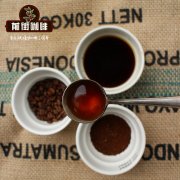The difference between Guatemala Vivette Nanguo Coffee and Antigua Coffee what is Guatemala CCDA

Professional coffee knowledge exchange more coffee bean information please follow the coffee workshop (Wechat official account cafe_style)
The coffee of Guatemala grows on the cloud belt at high altitude. The climatic conditions such as the large temperature difference between morning and evening make the coffee not grow too fast (because the coffee grows too fast will make the coffee softer and lighter). Coupled with the fertile volcanic soil, the cultivation conditions of Guatemalan coffee are the most ideal in Central American countries, and unlike the coffee beans produced in other Central American countries, the flavor is relatively clean and refreshing. There are more changes in the style of Guatemalan coffee due to different elevations. Antigua, the capital, and Vivette Nanguo Gaotai in the northwest are the two major producing areas, which are full of people's impression of Guatemalan coffee. Antigua coffee has a better richness and subtle smoky taste, while Vivetna fruit highland is characterized by delicate citrus acid.
Vivette Nanguo Highland, a place name with temperament, is located in the northwest of Guatemala. the soil of the highland is fertile and rainfall is abundant, and the cloud belt generated by the unique valley terrain of the high platform is the best coffee growing environment given by God. Therefore, Vivette South Fruit Highland is famous for producing high-quality coffee. Most of the winning beans in the Guatemalan coffee competition come from Vivette South Fruit Highland, which has a very good evaluation in the international community.
CCDA (Comit é Campesinodel Altiplano) began in 1982 during some of the most turbulent years of the civil war in Guatemala. Originally named the Campesino Committee for defending the Highlands, headquartered in San Martin Jilotepeque, Chimaltenango, the group was seen by the junta as an armed opposition group-eventually leading to the arrest, disappearance, assassination and exile of many CCDA directors. While the organization continued its efforts to fight for the land rights of indigenous communities CCDA changed its name to the Camplandsino Highlands Commission and hoped to establish a more peaceful relationship with the military authorities. However, it must continue to work in secret until the armed conflict gradually subsided in 1988.
CCDA successfully became a legal organization in 2000, and CCDA members were finally able to participate more freely at the regional, sectoral, national and international levels to protect indigenous access to land and agriculture, labour rights, human rights and the Mayan culture.
CCDA operates as a political organization in 11 departments in Guatemala, but Cafe Justicia-- supports the organizational branch of member coffee production and marketing-only in the Lake Attilan region. Coffee is one of the main sources of support for their political struggle; and Cafe Justicia hopes to continue to expand the market in the United States and Canada through our member roasters and others.
Locally, CCDA has made great progress in promoting organic agriculture by its members and Solol á. CCDA has four organic fertilizer production centers that produce bokashi, earthworm dung and effective microorganisms for its members. Their composting program has been growing since it was founded in 2008, and each center now produces about 1000 pounds of compost a month, which is then sold to members at a subsidised price of 60 squares (about $8) per 100lb. no, no, no. At the same time, bokashi and seedlings are available free of charge to members, based on the cooperative loyalty system and the total amount of coffee sold to external middlemen.
Through their hard work on the land and diligent quality control at every step from harvesting to drying the courtyard and finally choosing, CCDA members were able to produce premium coffee with classic Lake Attilan characteristics: clean and bright acidity, balancing the nuances of plums and tropical fruits, and rich palates. Through the successful export and sale of coffee, Cafe Justicia supported CCDA in lobbying for the Government of Guatemala for a more equitable rural development policy and fundamental respect for indigenous rights.
Improving access to education is an important achievement of Cafe Justicia labor. In terms of profits from coffee sales, CCDA has set up a scholarship fund-from elementary school to college. In 2012 alone, 32 of their students-sons and daughters of CCDA members-were enrolled in college as a result of the program. They also provide members with 200000 checks and rotational credit funds. Cafe Justicia provides a credit line of up to 5000 credits (about $650) for coffee area reform, pruning and shading management, as well as microcredit schemes for non-coffee-related investments. In the town of Quixay á, CCDA operates local clinics and pharmacies and provides discounted health services to CCDA members and the general community.
END
Important Notice :
前街咖啡 FrontStreet Coffee has moved to new addredd:
FrontStreet Coffee Address: 315,Donghua East Road,GuangZhou
Tel:020 38364473
- Prev

Brazilian Syrador Coffee beans-how to choose the charming sweet _ Syrador coffee from South America?
Professional coffee knowledge exchange more coffee bean information Please follow the coffee workshop (Wechat official account cafe_style). You who often drink coffee should have heard of Brazilian Syrador coffee beans in the coffee shop, and you all know that Syrador refers to the producing area of coffee beans, but do you know what kind of place it is? In this article, let's talk about this kind of charm from South America.
- Next

Butan Ministry small Cooperative Burundian Coffee Refining process hand-selected
Professional coffee knowledge exchange more coffee bean information please follow the coffee workshop (Wechat official account cafe_style) Butan Department Cooperative which is located in Bujumbura Province. The small cooperative, which has about 3000 members, each farming area is very small, no more than 1 hectare, because the area is very small, so it is very exquisite in handling, basically all of them are selected by hand.
Related
- Detailed explanation of Jadeite planting Land in Panamanian Jadeite Manor introduction to the grading system of Jadeite competitive bidding, Red bid, Green bid and Rose Summer
- Story of Coffee planting in Brenka region of Costa Rica Stonehenge Manor anaerobic heavy honey treatment of flavor mouth
- What's on the barrel of Blue Mountain Coffee beans?
- Can American coffee also pull flowers? How to use hot American style to pull out a good-looking pattern?
- Can you make a cold extract with coffee beans? What is the right proportion for cold-extracted coffee formula?
- Indonesian PWN Gold Mandrine Coffee Origin Features Flavor How to Chong? Mandolin coffee is American.
- A brief introduction to the flavor characteristics of Brazilian yellow bourbon coffee beans
- What is the effect of different water quality on the flavor of cold-extracted coffee? What kind of water is best for brewing coffee?
- Why do you think of Rose Summer whenever you mention Panamanian coffee?
- Introduction to the characteristics of authentic blue mountain coffee bean producing areas? What is the CIB Coffee Authority in Jamaica?

